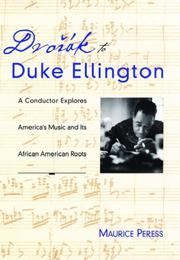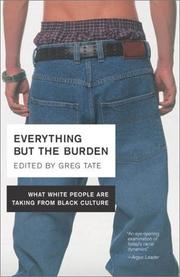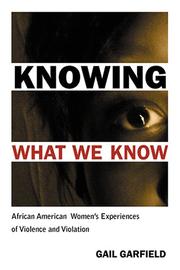| Listing 1 - 10 of 20 | << page >> |
Sort by
|
Book
ISBN: 0820313637 Year: 1992 Publisher: Athens London : University of Georgia Press,
Abstract | Keywords | Export | Availability | Bookmark
 Loading...
Loading...Choose an application
- Reference Manager
- EndNote
- RefWorks (Direct export to RefWorks)
Turner, Nat, --- In literature. --- United States --- Civilization --- African American influences. --- History --- Historiography. --- 1945 --- -United States --- African American influences --- 1961-1969 --- Historiography --- Turner, Nat --- Fiction --- Styron, William --- Littérature américaine --- Histoire et critique

ISBN: 0195098226 0195374479 1280451459 1602560609 0195356950 9786610451456 0195180712 0199869812 Year: 2004 Publisher: Oxford Oxford University Press
Abstract | Keywords | Export | Availability | Bookmark
 Loading...
Loading...Choose an application
- Reference Manager
- EndNote
- RefWorks (Direct export to RefWorks)
Prominent symphony conductor Maurice Peress describes his career conducting the premiers of such works as Leonard Bernstein's 'Mass' & Duke Ellington's 'Queenie Pie'. He traces the great impact of African American music on American music, beginning with the work of Antonin Dvořák.
Music --- Art music --- Art music, Western --- Classical music --- Musical compositions --- Musical works --- Serious music --- Western art music --- Western music (Western countries) --- African American influences --- Peress, Maurice. --- United States --- African American influences.
Book
ISBN: 0472129627 Year: 2021 Publisher: Ann Arbor, Michigan : University of Michigan Press,
Abstract | Keywords | Export | Availability | Bookmark
 Loading...
Loading...Choose an application
- Reference Manager
- EndNote
- RefWorks (Direct export to RefWorks)
A Change Is Gonna Come chronicles more than forty years of black music, from the hopeful, angry refrains of the Freedom movement to the slick pop of Motown; from Woodstock's "Summer of Love" to the war in Vietnam and the race riots that inspired Marvin Gaye to write "What's Going On"; from the disco inferno to the Million Man March.
African Americans --- Popular music --- Music and race. --- Music --- History and criticism. --- Race identity --- History --- Civil rights --- Songs and music. --- African American influences.
Book
ISBN: 022649635X Year: 2017 Publisher: Chicago, Illinois ; London : The University of Chicago Press,
Abstract | Keywords | Export | Availability | Bookmark
 Loading...
Loading...Choose an application
- Reference Manager
- EndNote
- RefWorks (Direct export to RefWorks)
Hip hop has long been a vehicle for protest in the United States, used by its primarily African American creators to address issues of prejudice, repression, and exclusion. But the music is now a worldwide phenomenon, and outside the United States it has been taken up by those facing similar struggles. Flip the Script offers a close look at the role of hip hop in Europe, where it has become a politically powerful and commercially successful form of expression for the children and grandchildren of immigrants from former colonies. Through analysis of recorded music and other media, as well as interviews and fieldwork with hip hop communities, J. Griffith Rollefson shows how this music created by black Americans is deployed by Senegalese Parisians, Turkish Berliners, and South Asian Londoners to both differentiate themselves from and relate themselves to the dominant culture. By listening closely to the ways these postcolonial citizens in Europe express their solidarity with African Americans through music, Rollefson shows, we can literally hear the hybrid realities of a global double consciousness.
Hip-hop --- Postcolonialism and music. --- Music --- African American influences. --- Europe. --- black Atlantic. --- culture industry. --- double consciousness. --- global hip hop. --- immigration. --- music. --- popular music. --- postcolonialism. --- race.

ISBN: 076791497X 9780767914970 Year: 2003 Publisher: New York : Harlem Moon/Broadway Books,
Abstract | Keywords | Export | Availability | Bookmark
 Loading...
Loading...Choose an application
- Reference Manager
- EndNote
- RefWorks (Direct export to RefWorks)
In a dazzling collection of essays, editor Geg Tate takes on what his mother used to call "everything but the burden," dissecting the ways in which white culture has misappropriated much of black culture, from music to dance, fashion, sports, and more.
African Americans --- African Americans --- African Americans --- African Americans --- Civilization --- Culture conflict --- Culture conflict. --- Kultur. --- Kulturkonflikt. --- Race relations. --- Racism --- Racism. --- Whites --- Whites --- Intellectual life. --- Intellectual life. --- Social conditions --- Social conditions. --- African American influences. --- Attitudes --- Attitudes. --- Since 1975. --- Schwarze. --- USA. --- United States --- United States --- United States. --- Civilization --- African American influences. --- Race relations.
Periodical

Year: 1997 Publisher: [Columbia, MO] : [University Park, PA] : [Lafayette, IN] : [Hanover, NH] : Houston, TX : [Afro-Romance Institute, University of Missouri] ; [Dept. of African and African American Studies of Pennsylvania State University], [Purdue University, Department of Foreign Languages and Literatures] [African and African American Studies at Dartmouth College] University of Texas at Arlington Libraries : Mount Holyoke College
Abstract | Keywords | Export | Availability | Bookmark
 Loading...
Loading...Choose an application
- Reference Manager
- EndNote
- RefWorks (Direct export to RefWorks)
African Americans --- Africans --- African diaspora --- Black people --- African Americans. --- African diaspora. --- Africans. --- Black people. --- Civilization --- African American influences. --- African influences. --- United States --- Latin America --- Caribbean Area. --- Latin America. --- United States. --- African American influences --- African influences --- Noirs américains --- Africains --- États-Unis --- Civilisation --- Influence noire américaine
Periodical

Year: 1997 Publisher: [Columbia, MO] : [University Park, PA] : [Lafayette, IN] : [Hanover, NH] : Houston, TX : [Afro-Romance Institute, University of Missouri] ; [Dept. of African and African American Studies of Pennsylvania State University], [Purdue University, Department of Foreign Languages and Literatures] [African and African American Studies at Dartmouth College] University of Texas at Arlington Libraries : Mount Holyoke College
Abstract | Keywords | Export | Availability | Bookmark
 Loading...
Loading...Choose an application
- Reference Manager
- EndNote
- RefWorks (Direct export to RefWorks)
African Americans --- Africans --- African diaspora --- Black people --- Black people --- Noirs américains --- Africains --- Africains --- African Americans. --- African diaspora. --- Africans. --- Black people. --- Civilization --- Civilization --- African American influences. --- African influences. --- United States --- Latin America --- États-Unis --- Caribbean Area. --- Latin America. --- United States. --- Civilization --- African American influences --- Civilization --- African influences --- Civilisation --- Influence noire américaine
Book
ISBN: 9789089643193 9789048514236 Year: 2012 Volume: *3 Publisher: Amsterdam
Abstract | Keywords | Export | Availability | Bookmark
 Loading...
Loading...Choose an application
- Reference Manager
- EndNote
- RefWorks (Direct export to RefWorks)
The Making of the New Negro onderzoekt zwarte mannelijkheid in de periode van de Harlem Renaissance, die lange tijd weinig wetenschappelijke aandacht trok, totdat in de jaren negentig veel geleerden ontdekten hoe complex, belangrijk en boeiend deze tijd was. Anna Pochmara maakt gebruik van Afro-Amerikaanse teksten, Amerikaanse archieven, niet-gepubliceerde geschriften en gelijktijdig Europees discours. Dit boek richt zich zowel op de canonieke New Negro Movement en Afro-Amerikaanse cultuur, vertegenwoordigd door onder anderen W.E.B. DuBois, Booker T. Washington, Alain Locke en Richard Wright, als op schrijvers die ondanks hun betekenis voor de beweging niet zo veel wetenschappelijke aandacht hebben gekregen, zoals Wallace Thurman. Pochmara combineert gender, seksualiteit en raciale studies met analyse en literair-historisch onderzoek.
American literature --- African American authors --- History and criticism --- African Americans --- Intellectual life --- United States --- Civilization --- African American influences --- Du Bois, William Edward Burghardt --- Wright, Richard --- Littérature américaine --- Histoire et critique

ISBN: 0813537592 0813536596 081353660X 9780813537597 9780813536590 9780813536606 0813580455 9780813580456 Year: 2005 Publisher: New Brunswick, NJ
Abstract | Keywords | Export | Availability | Bookmark
 Loading...
Loading...Choose an application
- Reference Manager
- EndNote
- RefWorks (Direct export to RefWorks)
In recent years there has been an attempt by activists, service providers, and feminists to think about violence against women in more inclusive ways. In Knowing What We Know, activist and sociologist Gail Garfield argues that this effort has not gone far enough and that in order to understand violence, we must take the lived experiences of African American women seriously. Doing so, she cautions, goes far beyond simply adding voices of black women to existing academic and activist discourses, but rather, requires a radical shift in our knowledge of these women’s lives and the rhetoric used to describe them. Bringing together a series of life-history interviews with nine women, this unique study urges a departure from established approaches that position women as victims of exclusively male violence. Instead, Garfield explores what happens when women’s ability to make decisions and act upon those choices comes into conflict with cultural and social constraints. Chapters explore how women experience racialized or class-based violence, how these forms of violence are related to gendered violence, and what these violations mean to a woman’s sense of identity. By showing how women maintain, sustain, and in some instances regain their sense of human worth as a result of their experiences of violation, Garfield complicates the existing dialogue on violence against women in new and important ways.
African American women --- Violence against. --- Crimes against. --- Afro-American women --- Women, African American --- Women, Negro --- Women --- Interviews. --- Jordan, Barbara, --- Conversation --- Interviewing --- Jordan, Barbara Charline, --- African Americans --- Intellectual life. --- United States --- Civilization --- African American influences. --- African American intellectuals
Periodical

Year: 1997 Publisher: [Columbia, MO] : [University Park, PA] : [Lafayette, IN] : [Hanover, NH] : Houston, TX : [Afro-Romance Institute, University of Missouri] ; [Dept. of African and African American Studies of Pennsylvania State University], [Purdue University, Department of Foreign Languages and Literatures] [African and African American Studies at Dartmouth College] University of Texas at Arlington Libraries : Mount Holyoke College
Abstract | Keywords | Export | Availability | Bookmark
 Loading...
Loading...Choose an application
- Reference Manager
- EndNote
- RefWorks (Direct export to RefWorks)
African Americans --- Africans --- African diaspora --- Black people --- United States --- Latin America --- Caribbean Area. --- Latin America. --- United States. --- Civilization --- African American influences --- African influences --- Noirs américains --- Africains --- États-Unis --- Civilisation --- Influence noire américaine
| Listing 1 - 10 of 20 | << page >> |
Sort by
|

 Search
Search Feedback
Feedback About UniCat
About UniCat  Help
Help News
News